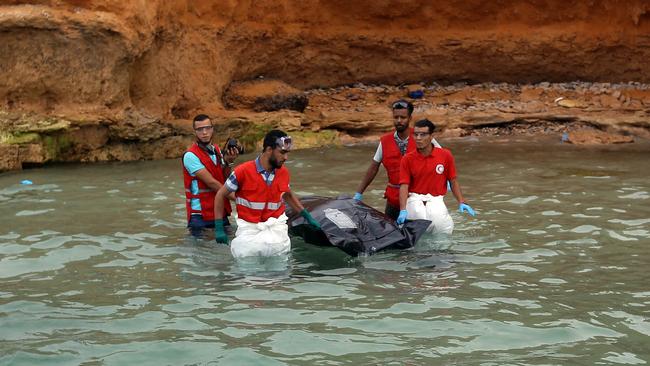Crossing sea in hope for better life claims one in 10 migrants
One in 10 migrants attempting to make the perilous crossing from Libya now drowns or goes missing at sea.

One in 10 migrants attempting to make the perilous crossing from Libya now drowns or goes missing at sea, as Europe tightens its borders to placate populist governments.
More than 200 people died in Libyan waters at the weekend, including three babies on an overcrowded dinghy that sank. The death toll on the route stands at 1068 so far this year — one in 10, according to Italian think tank ISPI — and 1405 for the Mediterranean as a whole.
The rise has been condemned by the International Organisation for Migration. Othman Belbeisi, a Libya-based official, said: “Smugglers are exploiting the desperation of migrants to leave before there are further crackdowns on Mediterranean crossings by Europe.”
Italy’s new populist government has banned the disembarking of migrants rescued at sea by aid groups such as Proactiva Open Arms, and Malta has effectively impounded vessels as they take on supplies, preventing them mounting rescue missions.
With no aid ships currently off the Libyan coast, the area is being patrolled only by the Libyan coastguard, which uses four patrol boats provided by the Italian government. Any migrants rescued are taken back to Libya.
The Italian government this week authorised the donation of 12 more vessels.
After a huge drop in sailings since the last northern summer, the numbers have picked up again, and about 1000 migrants were intercepted by the Libyan vessels at the weekend.
Mr Belbeisi said the rush was due in part to better weather. The blocking of aid ships by Matteo Salvini, Italy’s hardline Interior Minister, has prompted a split in the populist coalition government formed by the anti-migrant League party and the Five Star Movement.
Roberto Fico, the Speaker and a senior Five Star member, said at the weekend that Italian ports should reopen to migrants, adding that the rescue boats “do an extraordinary job”.
Returned migrants are being sent to government-run detention centres in Libya, where aid organisations fear poor conditions will worsen as the crush increases.
“Migrants returned by the coast guard should not automatically be transferred to detention and we are deeply concerned that the detention centres will yet again be overcrowded,” Mr Belbeisi said.
The ISPI report came as German Chancellor Angela Merkel came under fire from EU partners after she agreed to push back migrants in a final deal to save her fragile government, a move that threatened to unleash a domino effect of European nations shutting refugees out.
Mrs Merkel put down a rebellion by Interior Minister Horst Seehofer with a deal to tighten border controls and set up closed “transit centres” to hold migrants on the Austrian frontier. Austria vowed to “protect its southern borders”, while Italy attacked Berlin for adopting the “wrong attitude that brings no solution”.
The Times, AFP


